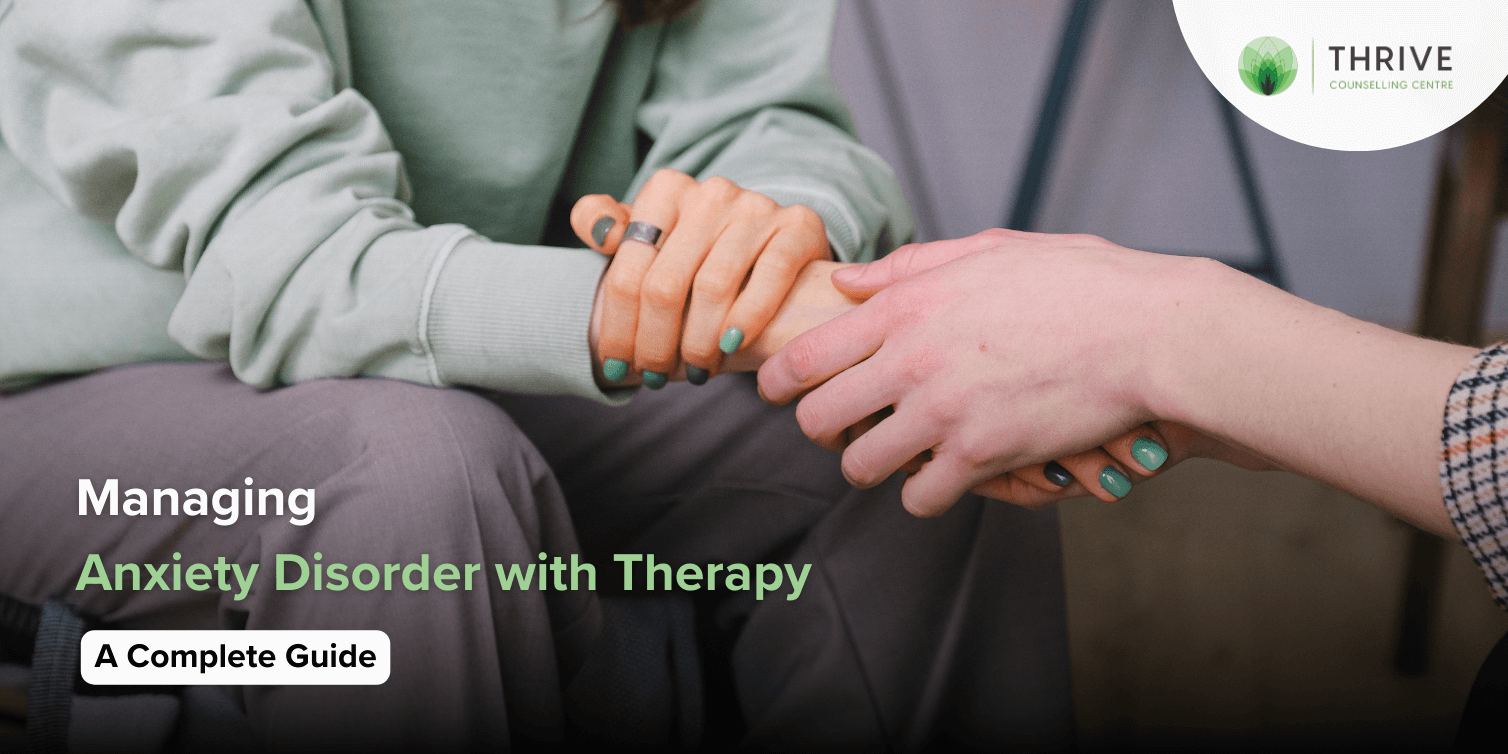How a licensed therapist for anxiety can help you handle daily stress
How a licensed therapist for anxiety can help you handle daily stress
Blog Article
Exploring Different Techniques in Therapy for Anxiety Problem for Long Lasting Change
When tackling anxiety conditions, it's important to check out a variety of therapy methods. Each approach provides one-of-a-kind insights and tools to assist you handle your symptoms properly. You may discover that incorporating methods can yield the most effective outcomes. Nevertheless, understanding the nuances of these approaches is key to promoting long lasting change. What happens if the appropriate combination could release a new degree of emotional health for you?
Understanding Anxiety Conditions: A Quick Review
Anxiety disorders, which influence countless individuals worldwide, can greatly impact life. You might experience frustrating sensations of fear or fret that seem unmanageable. These feelings can cause physical signs and symptoms like a racing heart, sweating, and even wooziness. Usual kinds of anxiety conditions consist of generalized anxiousness disorder, panic attack, and social anxiousness problem. Each has one-of-a-kind indications, but they all share a propensity to interrupt your regular and relationships.Understanding the source of your anxiousness is crucial. It may stem from genes, mind chemistry, or life experiences. Recognizing your triggers can help you handle your reactions better. It is necessary to bear in mind that you're not alone in this battle. Many individuals encounter comparable difficulties, and looking for aid is a strong step toward sensation much better. By learning more about anxiety conditions, you're currently on the path to understanding and managing your problem better.
Cognitive-Behavioral Treatment: Challenging Negative Idea Patterns
In Cognitive-Behavioral Therapy, you'll start by identifying the negative idea triggers that add to your stress and anxiety. You'll work on changing them with more positive alternatives as soon as you acknowledge these thoughts. Together, you'll construct reliable coping methods to help handle your stress and anxiety in daily situations.
Identifying Adverse Idea Triggers

Acknowledging the particular triggers behind your unfavorable ideas can be important in managing anxiety when you run into minutes of distress. Begin by focusing on situations that prompt sensations of worry or worry. Is it a crowded space, a future due date, or a discussion with particular individuals? Take down these circumstances in a journal. This will help you identify patterns in your thinking. Notification physical feelings that accompany your unfavorable thoughts, like an auto racing heart or rigidity in your upper body. By identifying these triggers, you acquire understanding into what's fueling your stress and anxiety. Recognizing these connections is the very first step in testing those ideas and ultimately reclaiming control over your psychological feedbacks.
Changing Thoughts With Positives
Challenging unfavorable thought patterns is an essential action in changing your state of mind and lowering anxiety. You might commonly find on your own trapped in cycles of insecurity or disastrous reasoning. Rather than letting these ideas dictate your feelings, method changing them with favorable affirmations or reasonable choices. As an example, when you assume, "I can not handle this," move it to, "I can handle obstacles one step each time." This simple modification can greatly affect your emotion. Routinely recognizing and countering these unfavorable ideas helps create a healthier inner dialogue. Keep in mind, it requires time and initiative, but regularly practicing this strategy can lead to long lasting modification, equipping you to encounter anxiety with restored self-confidence and strength.
Structure Coping Techniques With Each Other
Replacing unfavorable ideas is only the beginning of managing anxiety successfully. To create long-term change, you need to build coping techniques that empower you. Cognitive-Behavioral Therapy (CBT) assists you determine and test those purposeless idea patterns. Together, you and your therapist can discover just how these thoughts influence your feelings and behaviors.Start by establishing useful strategies, like journaling or mindfulness exercises, that permit you to face stress and anxiety head-on. When you encounter your concerns progressively, you'll learn to react in a different way.

Mindfulness and Acceptance-Based Approaches: Growing Present-Moment Awareness
As you browse the complexities of anxiousness, incorporating mindfulness and acceptance-based strategies can significantly boost your ability to grow present-moment awareness. By focusing on the present moment, you'll discover that you can observe your thoughts and feelings without judgment (Counseling services for anxiety). This practice helps you recognize your anxiety without feeling overwhelmed by it.Engaging in mindfulness workouts, such as deep breathing, body scans, or guided meditations, enables you to ground on your own in your present experience. Acceptance-based methods motivate you to accept your emotions instead of combat versus them. They lose their power over you.Incorporating these techniques right into your day-to-day routine can change exactly how you react to anxiety when you approve your feelings. You'll develop resilience and learn to browse demanding scenarios with higher simplicity. Inevitably, cultivating present-moment awareness lays the structure for long lasting adjustment, encouraging you to lead an extra satisfying life
Direct Exposure Therapy: Challenging Anxieties Slowly
Direct exposure therapy aids you confront your fears in a progressive method, making it less frustrating. You'll discover strategies to face anxiety-provoking circumstances step by step, while also building coping approaches to manage your reactions. This method equips you to take control and lower anxiousness with time.
Progressive Exposure Strategies

When facing stress and anxiety, gradually challenging your concerns can read this article be an effective means to reclaim control. This method, recognized as gradual direct exposure, entails gradually subjecting yourself to the circumstances or things that activate your anxiety. Beginning with less daunting situations and progressively work your method as much as more difficult ones. For example, if you hesitate of public talking, you may start by talking before a mirror, then proceed to sharing ideas with a friend, and eventually deal with a little group. Each step helps desensitize you to the worry, constructing your confidence over time. Remember, it's necessary to rate on your own and celebrate small success as you relocate with this procedure, reinforcing your capability to take care of stress and anxiety effectively.
Structure Coping Techniques
Building reliable coping techniques is vital for handling anxiety, specifically as you confront your fears gradually - Counseling services for anxiety. One effective approach is direct exposure treatment, where you start by encountering your anxieties in a controlled manner. Begin with less frightening situations and slowly work your way as much as even more tough situations. This progressive exposure assists desensitize you to anxiety triggers, making them much less overwhelming.Incorporate relaxation methods, such as deep breathing or mindfulness, to calm your mind throughout direct exposure. Track your progression, celebrating tiny success along the method to boost your confidence. Bear in mind, it's fine to take your time; the objective isn't perfection but stable improvement. By constructing these strategies, you'll equip on your own to browse anxiety and welcome life more totally
Psychodynamic Therapy: Discovering Source of Anxiety
Psychodynamic therapy discovers the subconscious mind, exposing the origin of your anxiety. By analyzing your ideas, sensations, and past experiences, this approach helps you discover underlying conflicts and unsettled concerns that might contribute to your present stress and anxiety. You'll work with a therapist to investigate childhood years experiences, partnerships, and psychological patterns that shape your actions today.As you get understanding into these deeper layers of your psyche, you'll begin to recognize how past events affect your existing behavior. This understanding can bring about catharsis, allowing you to refine feelings you might have suppressed.Through the restorative relationship, you can also determine defense reaction that might have established over time, offering a clearer course to change. Eventually, psychodynamic treatment equips you with the tools to resolve your stress and anxiety at its core, promoting enduring transformation in your emotional health.
Holistic and integrative Methods: Combining Methods for Greater Efficiency
Integrating different restorative strategies can enhance your journey toward handling anxiousness more efficiently. By integrating components from cognitive-behavioral treatment, mindfulness practices, and holistic methods, you can produce a tailored strategy that addresses your distinct demands. For example, you could make use of cognitive-behavioral strategies to test adverse idea patterns while including mindfulness workouts to ground on your own in today moment.Additionally, exploring holistic practices such as yoga or meditation can promote relaxation and reduce anxiety symptoms. This mix enables you to establish greater self-awareness and resilience.Experimenting with these diverse methods can aid you uncover what resonates most with you. Remember, it has to do with finding a harmony check my reference that functions, rather than sticking to a single strategy. This integrative method not only offers prompt alleviation yet likewise fosters lasting abilities for managing anxiety, encouraging you to recover control over your life.
The Role of Assistance Systems: Structure Durability Through Link
While it might appear that handling anxiousness is a solitary journey, having a solid assistance system can play a crucial function in your resilience. Bordering yourself with understanding close friends, click this site household, or support system develops a risk-free space where you can freely share your feelings and experiences. When you connect with others, you remind on your own that you're not alone in this struggle.These partnerships provide encouragement and can provide useful coping methods that have actually helped others. It's likewise an opportunity to gain point of view; friends can assist you see scenarios differently, minimizing sensations of isolation.Moreover, emotional support promotes a feeling of belonging, which can greatly minimize anxiousness symptoms. By leaning on your support group, you can develop strength and take on challenges better. Bear in mind, connecting for help signifies stamina, and it can make all the distinction in your trip toward managing anxiousness.
Frequently Asked Concerns
What Are the Common Symptoms of Anxiousness Disorders?
You might experience uneasyness, exhaustion, trouble focusing, impatience, muscular tissue tension, and rest disturbances. Physical signs and symptoms can include rapid heartbeat, sweating, and trembling. Recognizing these indications early can help you seek appropriate support and therapy.
How Much Time Does Treatment Typically Last for Anxiety Disorders?
Treatment for anxiousness problems normally lasts anywhere from a couple of weeks to a number of months. It really depends on your individual demands, progression, and the methods your therapist uses to aid you handle your stress and anxiety efficiently.
Can Medication Be Used Along With Treatment for Stress and anxiety?
Yes, medication can definitely be used along with therapy for anxiety. Incorporating both strategies usually improves treatment performance, assisting you manage signs and symptoms while discovering underlying issues via counseling (Counseling services for anxiety). Always consult your doctor for tailored recommendations
Are There Self-Help Approaches for Handling Anxiousness?
Yes, there are a number of self-help strategies for handling anxiety. You can exercise mindfulness, take part in routine workout, preserve a well balanced diet regimen, develop a routine, and utilize deep breathing methods to help minimize anxiety signs effectively.
How Do I Know if I Required Professional Assistance for Stress And Anxiety?

Report this page